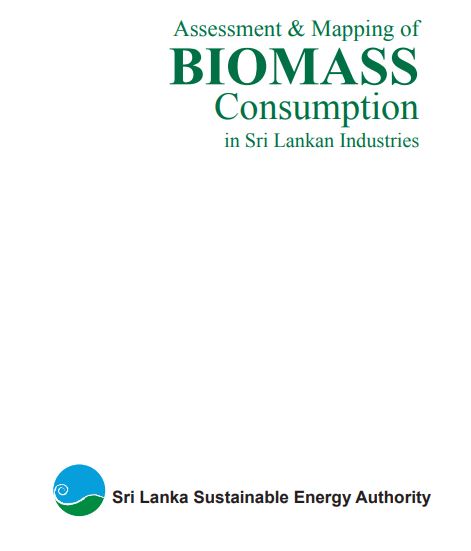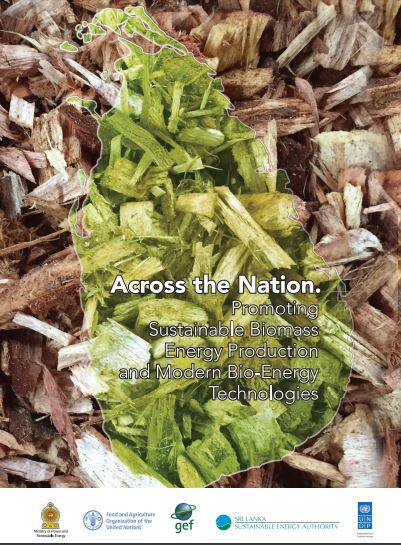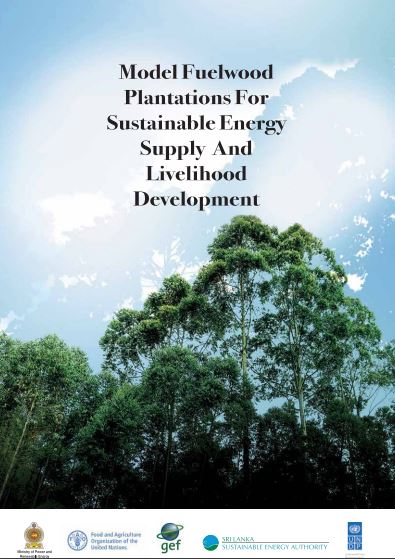Assessment and Mapping of Biomass Energy Consumption in Sri Lankan Industries
Sri Lanka Sustainable Energy Authority has completed the study of ‘Assessment and Mapping of Biomass Energy Consumption in Sri Lankan Industries’. It presents the findings related to biomass consumption in the industrial sector. Industries studied under the survey were tea, rubber, coconut, textile, major manufacturing industries, power plants, sugar, tile, lime, brick, pottery and others. This study comprised of analysis of data at regional level (up to Divisional Secretary Division), and the outcomes are presented as maps, prepared using a GIS software. Sample survey method was used for data collection and extrapolated to regional level. Analysis and mapping of biomass supply areas and pricing was done as well, in order to study any location based supply issues for different industries. E-copy of the report is available through the following link. The citations for further studies should follow as Sri Lanka Sustainable Energy Authority. 2015. Assessment and Mapping of Biomass Energy Consumption in Sri Lankan Industries. Colombo : Sri Lanka Sustainable Energy Authority, 2015. ISBN 978-955-1476-12-0.

Across the Nation – BIOMASS ENERGY 2022 – “Fueling the Economy-Protecting Forest”
The Sustainable Biomass Energy project has compiled the different types of case studies implemented by the project to demonstrate and support small, medium and large-scale industries to become sustainable businesses through the adoption of modern biomass technologies. Large scale industries include hotel chains, estates and plantations, and manufacturing plants etc., and small-scale industries include home-based businesses, cottage industries, rural enterprises and entrepreneurs who benefit through technologies that can accelerate production and improve quality. This five-year energy project works across the fuelwood value chain, tackling barriers for the wider adoption of modern biomass technologies from systematic growing of fuelwood species to mechanized harvesting and preprocessing, transport and storage to the efficient use for industrial processes. Additionally, this initiative supports the conservation of existing forests while meeting the wood energy demand for industries. E-copy of the booklet is available through the following link. The citations for further studies should follow as Sri Lanka Sustainable Energy Authority. January 2018. Across the Nation. BIOMASS ENERGY 2022 – “Fueling the Economy-Protecting Forest”, Sri Lanka Sustainable Energy Authority, 2015. ISBN 978-955-1476-19-9

Model Fuelwood Plantations for Sustainable Energy Supply and Livelihood Development
Whilst the Forest Department manages and maintains these forests, they have joined hands with the Sustainable Biomass Energy Project to establish model fuelwood plantations in lands belonging to the Department. These plantations would prevent further damage to these natural forests. The Project also collaborates with other government institutions such as the Coconut Cultivation Board (CCB) and the Rubber Research Institute of Sri Lanka (RRISL) (through their own lands and smallholder lands) to establish and promote these model fuelwood plantations. This Project supported provision to establish fuelwood plant nurseries, fuelwood plantations in buffer zones, and to enhance the capacity of fuelwood research through the establishment of a fuelwood arboretum. Additionally, model fuelwood plantations with NGOs and CBOs (in various parts of the country) have been established with the support of the Project to protect forest buffer zones from illegal felling while providing a sustainable fuelwood supply for these communities. These model projects also support families through livelihood enhancement. Perennial tree crops such as fruits and spices yield a significant volume of biomass during the application of improved crop management practices such as pruning and harvesting. This method is deemed sustainable as it utilizes by-products of forests or tree-crop management for energy generation while improving tree health. These tree crops also increase yields as they can be produced in large quantities and regrow rapidly after each harvest. The sustainable fuelwood production models fall under five different categories and aid decision makers, investors and land owners develop necessary policies, take decisions on investments and land use sustainably, economically and efficiently. E-copy of the booklet is available through the following link. The citations for further studies should follow as Sri Lanka Sustainable Energy Authority. October 2018. Model Fuelwood Plantations for Sustainable Energy Supply and Livelihood Development. BIOMASS ENERGY 2022 Project, Sri Lanka Sustainable Energy Authority, 2018. ISBN 978-955-1476-24-3

